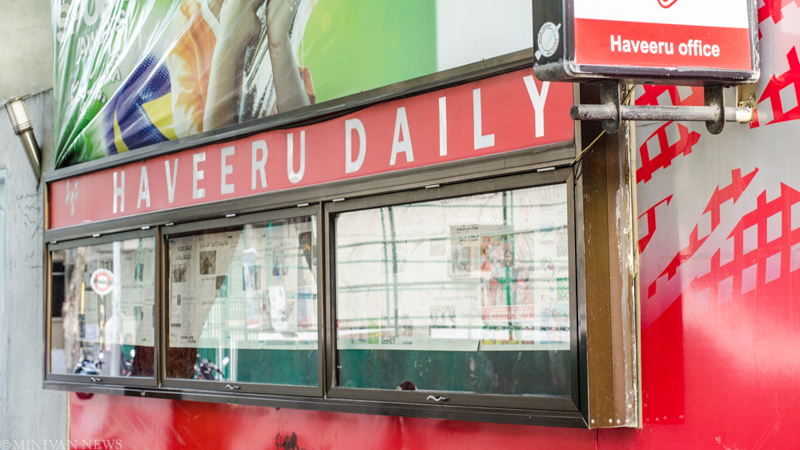The civil court has issued an order halting the publication of local daily Haveeru pending the outcome of a dispute over the ownership of the Maldives’ oldest newspaper.
According to Haveeru, the paper’s online version will continue to publish as the injunction only applies to the print edition.
The stay order comes after the High Court controversially ruled in August last year that Haveeru is not the sole property of its owner Dr Mohamed Zahir Hussain, and that three others – Abdulla Farooq Hassan, Ibrahim Rasheed Moosa and Mohamed Naeem – have an equal share in the enterprise.
The High Court ruling cleared the way for Farooq and Moosa to sue Zahir – chancellor of the Islamic University of Maldives and former education minister – at the civil court to claim a share of Haveeru’s profits for the past 35 years.
The civil court also ordered Haveeru today not to carry out any transactions from it’s bank accounts without Farooq and Moosa’s permission.
A source close to Zahir previously told The Maldives Independent that the court case was “politically motivated.”
The court-ordered ban on publishing the country’s most widely circulated and read newspaper has sparked outrage on social media.
Former President Mohamed Nasheed said in a tweet that the court should not have stopped the newspaper’s publication as the dispute concerns “business related to Haveeru, not the editorial.”
Haveeru was established in 1979, and has the highest circulation of any local newspaper. It became the first media outlet to launch an online version in 1997.
Farooq and Moosa are claiming a share of Haveeru based on a 1983 agreement which established the Haveeru news agency to operate the paper.
Zahir had maintained throughout the High Court appeal hearings the agency was set up to disseminate news and operate the daily, and that it had no claim to the newspaper’s assets and printing press.
The newspaper was re-registered to operate under Zahir’s name in 1985 following a dispute among the four founding members
Haveeru developed throughout the past 32 years with his investments, Zahir had said, but acknowledged that Farooq and Moosa were part of the Haveeru team at its inception.
The other three shareholders had not put up any capital in the venture, he said. Zahir had submitted documents to prove that he had invested in Haveeru with loans.
The three-judge High Court panel had ruled that despite Haveeru’s re-registration in 1985, the agreement of 1983 is valid to this day.
Judges Abdulla Didi, Abdul Rauf and Ali Sameer also referred to a 1980 letter sent from the home ministry to Moosa, which addressed him as the “owner of Haveeru.”
Moosa was acknowledged as the newspaper’s owner in a list of persons honoured for public service from 1972 to 1992, the judges said.
“The agreement signed on March 31, 1983 has not been annulled and therefore the agreement is present to date and valid. Furthermore, upon analysing the evidence and statements, the court concludes Dr Zahir has violated the agreement, and rules that Haveeru News Agency was formed under the aforementioned agreement and the properties brought under and run by the agency are the property of the founder members.”
The civil court order comes amidst growing concerns over press freedom in the Maldives after the government submitted a bill to criminalise defamation and restrict free speech.
The government-sponsored legislation will “prevent journalists and citizens from speaking out over serious accusations of corruption and the integrity of state officials,” ten senior journalists warned this week.

















